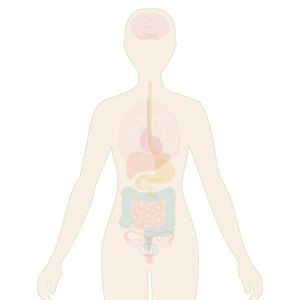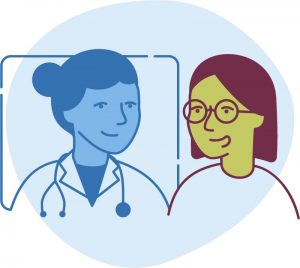Downloaded from www.mymenopausecentre.com
Direct URL: https://www.mymenopausecentre.com/symptoms/tinnitus-2/
Tinnitus
You may hear sounds that aren't coming from an external source, such as a ringing in the ears, buzzing, roaring, hissing, or clicking. These can be soft or loud, they may come and go or be constant.
Explore

Book an appointment
The highly experienced doctors and nurses in our menopause clinic are here to help you. Appointments from £190.
Book An AppointmentIf you would like to learn more about the impact of your symptom(s) complete our free online menopause questionnaire here.
What is tinnitus?
Tinnitus is a symptom of the menopause that you may not have heard of. It is the perception or hallucination of noise when no external sound is perceptible. Tinnitus can take many forms such as buzzing, ringing, roaring, whistling, clicking – it’s whatever the person describes it to be and is unique to them. It can vary, therefore, from person to person.
What causes tinnitus?
There are many different causes of tinnitus or factors that can worsen it:
- Hearing loss is probably the most well-accepted associated reason for tinnitus. If you lose your hearing, you start to process nerve signals from the ear to the brain differently and may experience sounds that don’t arise from an external stimulus. The theory is that you’re processing nerve stimulus from the cochlea or auditory pathway (in the innermost part of the ear) to the brain that translates into sound in the brain.
- Tinnitus is often associated with hearing loss as a result of noise exposure, raised blood pressure and changes in medication (for example aspirin and other non-steroidal anti-inflammatory drugs, loop diuretics and quinine).
- Caffeine can also affect tinnitus.
- Dehydration and a diet high in salt may also cause or worsen tinnitus. The cochlea is the inner ear. It controls hearing and is related to the semicircular canal which controls balance. It has a blood supply that is very small and easily compromised – for example by high blood pressure or migraine (these can cause spasms of the blood vessels that can temporarily disrupt the function of the cochlea and semicircular canals). As there is fluid in the semicircular canals, dehydration can affect the function of the vestibulocochlear apparatus.
- Caffeine and some medication can affect the cochlear and are also associated with tinnitus – which is how they impact on hearing and balance disturbance.
- Ear wax or fluid in your ear, from an ear infection, for example, can also trigger changes in pressure and movement of the ear drum which can result in fluctuating tinnitus.
- There are some physical causes of tinnitus. Some describe tinnitus when they have temporomandibular joint dysfunction where the jaw joint clicks – they think this is tinnitus when it is actually an issue with the joint of the jaw. Tinnitus that pulsates with your heartbeat may relate to blood vessel abnormalities (rare) or very high blood pressure.
- Finally, there are a few but rarely diagnosed serious causes of tinnitus. They come from growths on the hearing nerve, such as vestibular schwannoma or an acoustic neuroma, but they’re extremely rare.
How many women typically experience tinnitus as a result of the menopause?
Tinnitus is experienced by 10-25% of adults [1]. We don’t know how many women experience it in the menopause. What we do know is that tinnitus worsens with age and women around menopausal age are at a higher risk of suffering from it.
Is tinnitus linked to (any particular stage of) the menopause?
There are oestrogen receptors all over a woman’s body including the ear and the cochlea. With the loss of oestrogen in the ear and cochlea during the menopause transition, some women may lose high-pitched/high-frequency hearing. This can worsen with age. Our brain may then ‘add in’ that high-pitched sound without the external stimulus.
Sleep is also impacted by the menopause and insomnia and tinnitus are also linked. However, it is not completely clear whether this is cause or effect. Some people with tinnitus may find they have greater difficulty falling asleep. The shift from a relatively noisy daytime environment to the quietness of the bedroom can make the tinnitus noises more noticeable.
Stress and anxiety can also have a negative impact – and they can also increase in the menopause either in their own rightor as a result of other symptoms of the menopause.
How can tinnitus be treated?
Firstly, we need to rule out sinister or other causes of tinnitus that may need further investigation and treatment. So please talk to your doctor about your symptoms.
You should see a doctor urgently if:
- You have weakness in your face muscles or new drooping or asymmetry of the face and unexplained hearing loss
- You experience pain in your ear, discharge from your ear, dizziness, or vertigo
- The tinnitus is pulsatile (i.e. characterised by a regular, rhythmical beating or throbbing)
You could consider getting a hearing test before seeing your GP – or else discuss this with your doctor. A hearing test would help determine whether hearing loss is a factor in developing tinnitus.
There are many strategies that can help manage tinnitus. Once any treatable or modifiable causes of tinnitus have been dealt with, there is unfortunately no medication that will make tinnitus go away. People with tinnitus need support to learn to live with this condition, which can be very challenging.
Reducing caffeine and reducing salt in the diet can help. and good sleep hygiene is really important.
Self-help for tinnitus is often useful. Information and resources such as the British Tinnitus Association’s helpline, information leaflets and website are available to give people tools for self-management.
Other treatment options available include:
- Counselling (such as CBT)
- Correcting any hearing loss
- Sound therapy
- Relaxation techniques
- Mindfulness meditation
Once you are aware of tinnitus, you really do need to try to make it your friend. It’s very often not serious, and once you acclimatise to it, and if you’re not tired, not stressed, not too anxious, then it will be less obtrusive.
Can HRT help manage tinnitus?
There has only been a small amount of research to show that HRT may help improve tinnitus that started in the menopause transition when it was experienced alongside other menopause related symptoms. HRT may work by protecting the neurological pathways. [2] The trial was small and not a randomised control trial so we don’t have a definitive answer – but as long as the benefits of HRT outweigh the small risks for you and particularly if you have other symptoms of the menopause, HRT could be trialled.
What next?
If you’re worried about tinnituss, you should see your GP. To talk about this symptom in the context of the menopause, book an appointment with our menopause clinic.
If you think you may be experiencing symptoms of the menopause transition, you can learn more with our symptom checker or by taking our Menopause Questionnaire.
You can also find more information about the menopause transition at the British Menopause Society and the National Institute for Health and Care Excellence.
Authored by:
Dr Clare Spencer
Registered menopause specialist, GP and co-founder; see Dr Clare in person at The Spire Hospital, Leeds or online
Last updated:
23/11/2024
Book an appointment
The highly experienced doctors and nurses in our menopause clinic are here to help you. Appointments from £190.
Book An AppointmentLearn more

Book a consultation
Whether you want to discuss your symptoms, create a treatment plan that's right for you, understand some test results or have a check-up, the highly experienced doctors and nurses in our menopause clinic are here to help you.
Book nowReferences
-
https://www.nidcd.nih.gov/
-
Chen HC, Chung CH, Chen VCF, Wang YC, Chien WC. Hormone replacement therapy decreases the risk of tinnitus in menopausal women: a nationwide study. Oncotarget. 2018 Feb 8;9(28):19807-19816.
Contact My Menopause Centre
- General enquiries: hello@mymenopausecentre.com
- Book appointments online: Log into your account and go to 'My appointments'
- Book appointments by phone: 0333 444 1067
- Website: https://www.mymenopausecentre.com


















